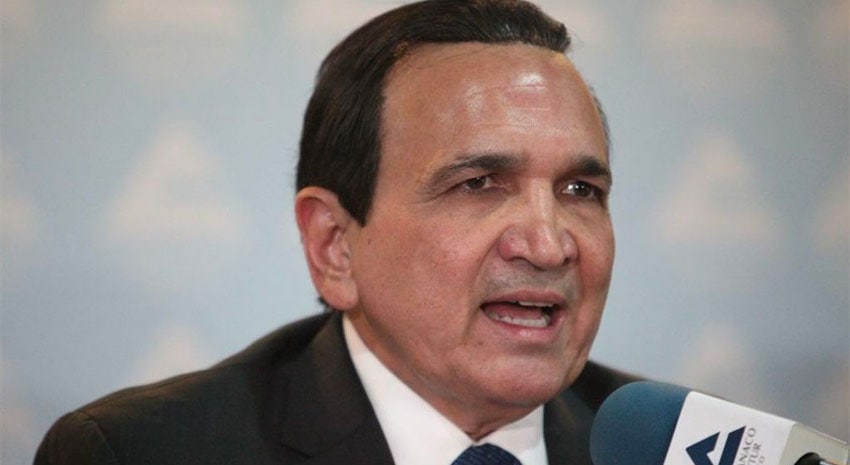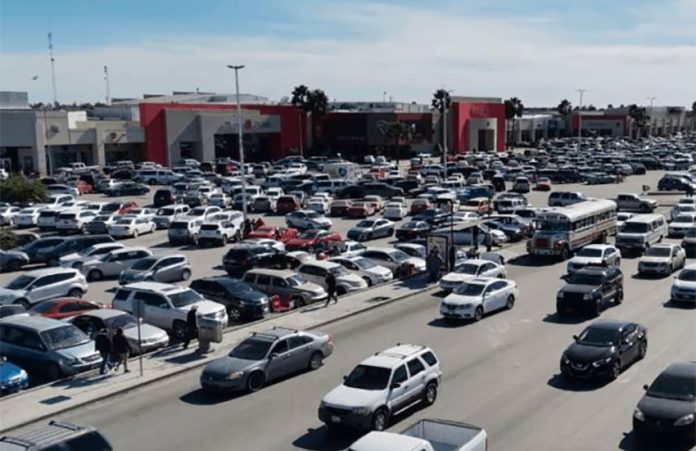Some businesses in northern border cities have seen their sales increase by up to 40% since March 2020 due to the pandemic-induced closure of the Mexico-United States land border to nonessential traffic, according to a business group.
The United States announced last week that it was extending the closure of its border to Mexicans traveling for nonessential purposes such as shopping and tourism until August 21. Mexico eased its restrictions in April, although it hadn’t strictly enforced the border closure before then.
Unable to enter the U.S. for shopping as they did regularly before the pandemic, many residents of border cities such as Tijuana, Ciudad Juárez and Matamoros have had to buy food and other essentials at home, providing a boost to local economies.
Between March 2020 and late July of 2021 commerce on the Mexican side grew in some sectors by up to 40%, representing more than 45 billion pesos (US $2.25 billion) in domestic consumption and more than 125 billion pesos ($6.26 billion) in general consumption, according to the Confederation of Chambers of Commerce, Services and Tourism (Concanaco).
José Manuel López Campos, the organization’s president, said many residents of border cities were accustomed to buying food, clothing, footwear, gasoline and other products and services in the United States before the pandemic.
However, they now make the same purchases in businesses in cities in Mexico’s six northern border states: Baja California, Sonora, Chihuahua, Coahuila, Nuevo León and Tamaulipas.
López said that people who previously shopped in the U.S. have now realized that the quality of products sold in Mexico is just as good and they are competitively priced.
He noted that there are 115,000 United States visa-holders in Matamoros alone and that those who shopped across the border before the pandemic spent an average of US $300 per month there. That money, López said, now stays in the Tamaulipas border city, located adjacent to Brownsville, Texas.
The Concanaco chief said he was confident that the United States would reopen its land border to nonessential traffic after the end of the extension announced last week. Mexico has ramped up Covid-19 vaccination in border cities with a view to expediting the reopening.
It remains to be seen whether Mexicans who previously shopped in the U.S. will return to their previous habits in large numbers once the border reopens or whether many will continue to spend their money locally.
Businesses in United States border cities will be hoping that the former occurs. One study found that the economies of U.S. border communities have suffered losses of US $10 billion since March 2020 due to the inability of many Mexicans to cross the border to go shopping, eat in restaurants and fill up their cars.

López said that hundreds of businesses in U.S. border cities have closed due to the sharp reduction in Mexican shoppers over the past 16 months.
Laredo, Texas, located across the border from Nuevo Laredo, Tamaulipas, is one city that has suffered from the lack of Mexican daytrippers.
“Downtown Laredo has been visibly affected by pandemic-era bridge closures, with many businesses closed and ‘for rent’ signs hanging on many buildings,” reported Texas-based news outlet KENS 5.
“People have lost their dreams. People have lost their businesses. People have lost their livelihood,” said Congressman Henry Cuellar, who represents Laredo in the United States House of Representatives.
“That’s not only the small business owners, but think about the thousands of people that were working at those small businesses. What are they doing now? They don’t have jobs. This is why Washington has no clue, and I emphasize no clue of what’s happening to us down here at the border.”
Ester Zúñiga, a resident of Harlingen, Texas, spoke to KENS 5 while shopping in downtown Brownsville. She said she knows people who are barely surviving as a result of the closure of the border.
“I know people that have stores open here and they’re closed now and sometimes they call me and say that they don’t have enough for food or to pay the rent. There’s people that went back to Mexico because there’s no jobs for them,” Zúñiga said.
She explained that the border closure affects her personally because her mother lives in Matamoros but cannot come to visit her and her son despite having a U.S. visa.
“The bridge is closed, but I really don’t understand why they let us cross to Mexican cities like Matamoros, but they don’t let them cross over here when, in reality, the economy depends a lot on the people that live in Matamoros, Reynosa and their surroundings,” Zúñiga said.
Brownsville Mayor Trey Mendez also expressed frustration at the closure.
“Our border economy depends quite heavily on these Mexican travelers coming to visit their family, coming to spend money at some of our stores,” he said.
“We know we lost some money [but] as far as how much we’ve lost it’s really difficult to put a number on that.”
With reports from KENS 5
